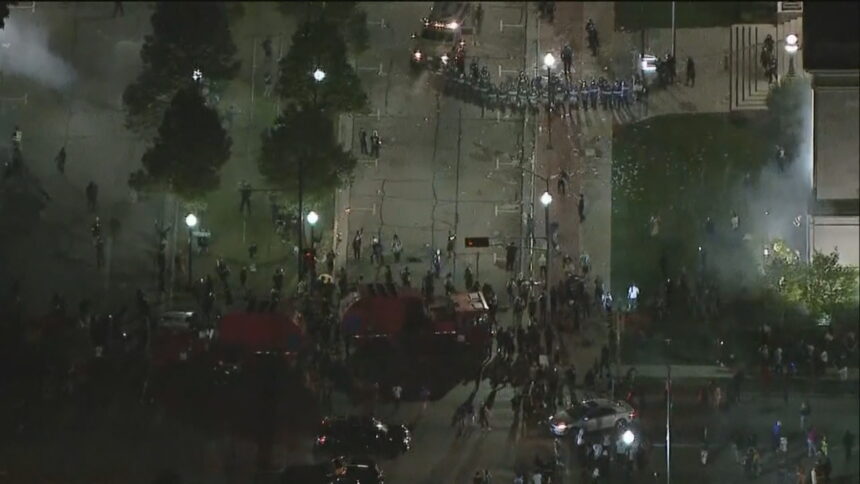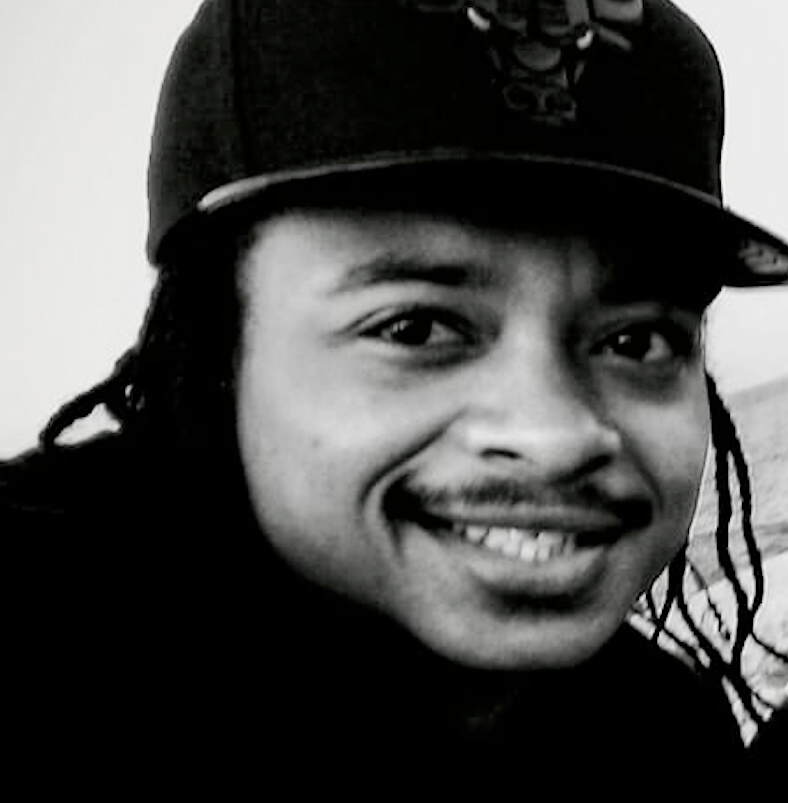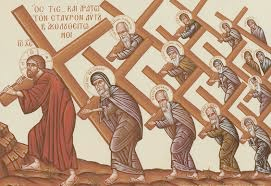Co-Missioners,
Steve Kuhl, a frequent contributor of late, serves an Episcopal congregation in South Milwaukee, not all that from Kenosha, Wisconsin. He sends along a reflection he wrote for his parishioners about the recent turmoil there. He’ll provoke your thinking too—or so we trust.
Peace and Joy,
The Crossings Community
A letter from Steve Kuhl

Dear Christian Friends,
We witnessed with horror and sadness another senseless shooting of a Black man this week. This time it was our own Jacob Blake in Kenosha. I invite you to pray for Jacob, his family, and the community of Kenosha, for those who suffered loss of property, for those White protesters killed or wounded by a White vigilante shooter, and for the shooter himself. As appalling as this vigilantism is—and as odd it was that he could walk away unquestioned by police—the shooter is also, in a sense, a victim of racism. It could very likely ruin the rest of his life, even though he is pleading self-defense. His actions reveal just how suggestible the minds of youth are to the corrosive suasion of racism. They hear the dog whistles, but don’t comprehend the consequences of acting on them.
Racked with anguish, the victims of racism and the Black Community, generally, fear they have nowhere to go with their hurt, their anger, and their pain. Pray for them and, more, stand with them, if not physically, side by side, then at least in spirit and in the choices you make. Choices matter. Pray also for our nation. For the injustices that the Black Community faces is not only a threat to them, but a threat to justice-loving people everywhere—Black, Brown and White. Martin Luther King, Jr. (whose “I Have a Dream” speech was given 57 years ago yesterday, August 28, at the first March on Washington) says it best in his “Letter from Birmingham Jail”: “Injustice anywhere is a threat to justice everywhere. We are caught in an inescapable network of mutuality, tied in a single garment of destiny. Whatever affects one directly, affects all indirectly.”
Let us meditate hard on these words. We who are in the White majority in America are easily fooled into thinking that our destiny is not intertwined with the destiny of Black and Brown people. That’s because, so far, we have escaped ultimate judgement for our sins. We came to this land and took it from Native Americans and got away with it. We brought Black slaves to this country 400 years ago this year (it was in 1620 when the first slaves were brought over) and got away with it. We founded this “democracy” (remember, the word means “people-rule”) on the rights of white male rule and got away with it. We founded this country on the premise of “religious freedom” but denied it to other faiths as they stepped foot on this soil. To be sure, there has been a chipping away at some of these historic hypocrisies. (And the consensus is that those change haven’t hurt us, but improved us.) But they did not come because they were welcomed at the time; they came only because the facade of “getting away with it” had developed cracks.
There is a price to be paid for holding onto these hypocrisies. And let’s be clear why these hypocrisies exist. They exist because the historic White establishment wants to preserve its historic power. Don’t be fooled by the rhetoric of “Make America Great Again.” It really means, “Return Power to the Hands of White America Again.” It is a betrayal of what the nation’s founders said would make America great—democracy, people-rule—even though they themselves could not find the will to realize it fully. They settled for the institutionalization of slavery, for male-only suffrage, for American expansion at the expense of Natives, etc. And this the price of all of this. Preserving power to advance one’s own self-interests at the expense of others is illusory. Those who would try to save their power, that kind of way of life, will lose it. Self-preservation, amassing privilege for oneself at the expense of others, is doomed to fail.
I did not learn this from studying political philosophy or theory—although you can find it there. I learned this from studying theology. As a Christian this means I learned it from the one, holy, catholic and apostolic Church, which passes it on by immersing us in the Bible. This mean I learned it from God. I know that is an audacious thing to say, especially when historic injustices like racism have also been perpetuated and justified by people claiming to be Church-supporting, Bible-believing, God-fearing Christians. But just as slaves could sift out Biblical truth—the truth of the gospel—from the distortions of their masters, so can others. Indeed, that was one of Luther’s central if paradoxical premises. The gospel he proclaimed against the church was the gospel he received through the church in spite of its own distortions. The Spirit works as much in spite of us as it does because of us.
I think the Gospel of a recent Sunday speaks about as clearly as any to the problem of racism, the problem of pursuing self-preservation at the expense of others. The text was Matthew 16:20-28. You probably know the outlines of the story well. Still, bear with me as I unpack it.
Jesus has just finished his preaching tour of Palestine, traveling from the southern Judaean wilderness to Caesarea Philippi in the north. There he pauses and asks his disciples the question of questions: Who do think he is? Have they gotten the point? Peter answers. “You are the Christ/Messiah, the Son of the living God.” Peter is right and Jesus acknowledges it. At least, Peter has gotten the titles for Jesus right. Then, Jesus goes on to explain what those titles mean. In order for me to be the Christ, your savior, “I must go to Jerusalem, endure great suffering at the hands of [the establishment], be killed and on the third day rise.” But Peter will have none of this, so he rebukes Jesus. “God forbid. This must not happen to you.” But Jesus rebukes Peter back: “Get behind me, Satan. You are setting your mind on human things, not divine things.”
 What’s going on in this exchange is clarified by what Jesus says next. If you, Peter, want to be my disciples you must “deny yourself, take up your cross, and following me. For those who want to save their life will lose it, and those who lose their life for my sake will save it.” Peter’s problem is that he is thinking in terms of “saving his life.” He is bent on self-preservation at all costs. Of course, it is not only Peter who thinks this way. All humanity does. It has become humanity’s “common sense,” so to speak. Note how glibly we justify injustice, racism, police brutality, economic inequity, slave wages, etc. It’s because to change such things would threaten our way of life. We do it in the name of saving our life—our self-preservation. And worst of all, we say this is God’s will! “God forbid” that our self-preservation isn’t the highest good! God, we assume, is surely on our side in this matter.
What’s going on in this exchange is clarified by what Jesus says next. If you, Peter, want to be my disciples you must “deny yourself, take up your cross, and following me. For those who want to save their life will lose it, and those who lose their life for my sake will save it.” Peter’s problem is that he is thinking in terms of “saving his life.” He is bent on self-preservation at all costs. Of course, it is not only Peter who thinks this way. All humanity does. It has become humanity’s “common sense,” so to speak. Note how glibly we justify injustice, racism, police brutality, economic inequity, slave wages, etc. It’s because to change such things would threaten our way of life. We do it in the name of saving our life—our self-preservation. And worst of all, we say this is God’s will! “God forbid” that our self-preservation isn’t the highest good! God, we assume, is surely on our side in this matter.
Why is the human mind obsessed with self-preservation? Where does this idea come from? Jesus couldn’t be clearer. “Satan.” The word “Satan” means adversary and is a traditional word to sum up all that opposes God and God’s will. A like word is “evil,” which also means “to oppose.” Evil is that which opposes God. It is the human mind set on self-preservation at all cost by the Satan, God’s opponent. This is one of the Bibles’ first teachings. Although God created the world and declared it good, humanity included, (Gen. 1-2), we nevertheless see how this world— or, more accurately, human beings, the God-designated stewards of creation—turned against God (Gen. 3). We humans have learned to bite the very hand that creates and feeds us. In the process humanity has also turned on itself and on the natural world that sustains human life . We bite one another and foul the very nest in which we live.
The essence of evil, then, is believing the lie of Satan, which is always a sinister twisting of the truth and a distorting of reality. And the most basic substance of the lie is that “I know what is best.” I make my will the basis for determining what God’s will is. I undo what God did when he “created me in his image,” and seek to recreate God in my image. In Genesis, this is metaphorically played out in the story of the “tree of the knowledge of good and evil.” Why does God tell us, humanity, not to pick and eat from that tree? Not because God doesn’t want us to love good and hate evil. But because good and evil is not decided on the basis of our self-interest, but God’s interests, the interests of his creation as a whole—the common good, as we might call it..
Why we humans believe this lie is a mystery. That we humans believe this lie—and live it out in our daily lives—is an inescapable fact. The mystery and fact of the lie confounded St. Paul as much as anyone. Listen to his lament: ” I do not understand my own actions…. For I do not do the good that I want, but the evil that I do not want I do…. Wretched man that I am! Who will rescue me from this body of death?” (Rom. 7:15-24).
To that last question there is hope in the answer Paul gives us from God. “Thanks be to God through Jesus Christ our Lord!” Although we don’t know why we sin, we know that we do; but even more, we know of God’s own remedy for sin. It is Jesus Christ. And here is Jesus’ crystal-clear prescription. “Deny yourself, take up your cross, and follow me.”
Please, before you object, hear Jesus out. This is good news.
“To deny ourselves” means “to give up on self-preservation at all costs.” At its most basic level, “to deny ourselves” is what the gospel calls “repentance.” It means acknowledging that the life I have made for myself must not simply change, but come to an end. No compromise is possible. Life in its business-as-usual form must end. And if I need any evidence for that all I need to do is look honestly into the mirror of God’s law. Every commandment is broken. If looked at honestly, the mirror reveals that I have not loved God above all things or my neighbor as my equal.
“Take up the cross” means “Accept the consequence of this sinful life.” It means accepting that you will die, that this life will ultimately have to go. For God there is no such thing as “too big to fail.” Indeed, you could “gain the whole world”—and believe me, we all try—but it will not prevent the forfeiture and foreclosure of your life or the life of your nation. Jesus said earlier, “I have not come to abolish the law, but to fulfill it” (Matt. 5:17). For the guilty the fulfillment of the law happens in the sentencing stage. For the wage of sin—the verdict on it—is death. Sin, living Satan’s lie, is ultimately treason against God—and to commit treason against one’s own source of life is to forfeit life.
“Follow me.” This last line in Jesus’ prescription is the remedy. The first two lines point out the disease. But in saying, “follow me,” Jesus is saying, “don’t be afraid of the bad news, trust me to lead you through to new life.” It’s like the doctor saying to the patient: “Don’t be afraid of your cancer, trust me to cut it out and give you a clean bill of health.” Of course, the surgery a doctor performs on cancer can’t compare to the radical surgery of the cross that Jesus preforms on sinners. His surgery is nothing short of a self-ectomy on us. Our very self must be removed and replaced with a whole new self that is Christ. That’s what Jesus means when he says, “those who lose their life for my sake will find it.” The life we now “find” in us is Jesus’ new resurrected life.
Here too we are dealing of course with a profound mystery that we can never fully comprehend. Parts of it, I think, we can understand, such as, Jesus’ “I forgive you.” But other parts, such as Jesus’ “I will raise you up new,” we can’t. Nevertheless, there is factual evidence of the emergence of this new self as it begins to emerge. The evidence is in actually “following Jesus,” that is, trusting in him, repenting of our sin, and beginning to love others as he has loved us. All this Jesus summarizes as “obeying everything that I have commanded you” (Matt. 28:20).
 Concretely, in our present context, that new self would include confessing the sin of racism and living what Ibram Kendi calls an “antiracist” life. (See Ibram X. Kendi, “How to be an Antiracist.”) That would include not only being open to, but working towards the replacement of malignant racial policies, practices, inequities, and ideas with healthy ones that reflect the good God intended for the creation when he first made it, marked by all things working together for good (Gen 1:31), what we often call “the common good.” An antiracist is one who is like the Good Samarian. Upon seeing someone victimized by racism, he doesn’t simply pass on the other side of the road, saying “I’m not a racist,’ I don’t do that. Rather, seeing the victim he does what he can to help. He says “I am an antiracist.” This also matches Luther’s way of describing the meaning of the commandments. To keep the commandment does not mean simply saying “I’m not a murderer,” that is, “I neither endanger nor harm the lives of my neighbors,” but to say rather “I am an anti-murderer,” as in “I help and support those neighbors in all of life’s needs.” (Luther’s Small Catechism, Explanation of the Fifth Commandment, Book of Concord, Kolb and Wengert, p. 352).
Concretely, in our present context, that new self would include confessing the sin of racism and living what Ibram Kendi calls an “antiracist” life. (See Ibram X. Kendi, “How to be an Antiracist.”) That would include not only being open to, but working towards the replacement of malignant racial policies, practices, inequities, and ideas with healthy ones that reflect the good God intended for the creation when he first made it, marked by all things working together for good (Gen 1:31), what we often call “the common good.” An antiracist is one who is like the Good Samarian. Upon seeing someone victimized by racism, he doesn’t simply pass on the other side of the road, saying “I’m not a racist,’ I don’t do that. Rather, seeing the victim he does what he can to help. He says “I am an antiracist.” This also matches Luther’s way of describing the meaning of the commandments. To keep the commandment does not mean simply saying “I’m not a murderer,” that is, “I neither endanger nor harm the lives of my neighbors,” but to say rather “I am an anti-murderer,” as in “I help and support those neighbors in all of life’s needs.” (Luther’s Small Catechism, Explanation of the Fifth Commandment, Book of Concord, Kolb and Wengert, p. 352).
I know this is a lot to chew on. But I write it for a purpose. Satan’s lie is being repeated with great force over and over again in these troubling times. That lie seeks not only to confuse us about how to respond neighborly both to the coronavirus and to racial strife, but it tempts us to forsake what Paul calls “the mind of Christ” or what Jesus describes as “setting our minds on divine things.” To set the mind of divine things, the mind of Christ, means to “do nothing from selfish ambition or conceit, but in humility regard others as better than yourself”; it means to “let each of you look not to your own self-interests, but to the interests of others” (Philippians 2:3-4). It is the calling of pastors like me to proclaim the word and will of God in Christ so that frontline disciples of Christ like you may “not be conformed to this world, but be transformed by the renewal of your mind, so that you may discern the will of God—what is good and acceptable and perfect” (Rom. 12:2). Let our prayer be, “Thy will be done on earth as it is in heaven.”
Your Servant in Christ,
Fr. Steve
Thursday Theology: that the benefits of Christ be put to use
A publication of the Crossings Community



You must be logged in to post a comment.